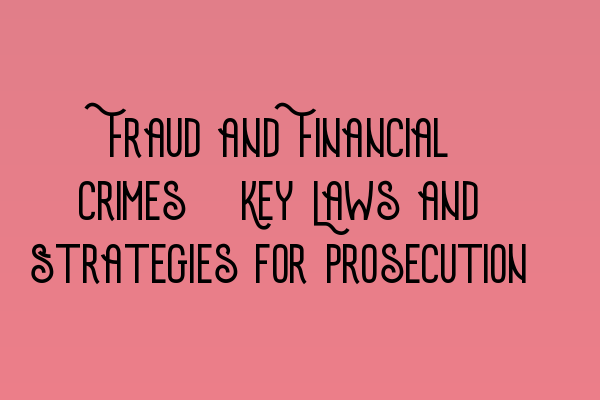Fraud and Financial Crimes: Key Laws and Strategies for Prosecution
Financial crimes, including fraud, have become increasingly prevalent in today’s society. To effectively combat these crimes and ensure justice is served, it is crucial for legal professionals to understand the key laws and strategies for prosecuting fraud and financial crimes.
Understanding Fraud and Financial Crimes
Fraud involves the deliberate deception of another party for personal gain. Financial crimes encompass a range of illegal activities, including money laundering, embezzlement, insider trading, and identity theft. These offenses can have severe consequences on individuals, businesses, and the overall economy.
When prosecuting fraud and financial crimes, it is important to gather substantial evidence to prove intent, motive, and the actual occurrence of the crime. This evidence may include financial records, witness testimonies, surveillance footage, and expert opinions.
Key Laws for Prosecution
The legal framework for prosecuting fraud and financial crimes varies depending on the jurisdiction. In the UK, several key laws are relevant to these offenses, including:
- Demystifying the Solicitors Qualifying Examination Format
- LLC Formation Made Simple: Step-by-Step Guide for UK Entrepreneurs
- LLC Formation: A Step-by-Step Guide for UK Entrepreneurs
- Business Regulations in the UK: A Comprehensive Overview
- Ethical Considerations in UK Law: Upholding Professional Standards
These articles provide valuable information on related legal topics, helping solicitors and legal professionals familiarize themselves with the relevant laws and procedures.
Prosecution Strategies
Successful prosecution of fraud and financial crimes requires strategic planning and execution. Some key strategies include:
- Gathering Substantial Evidence: As mentioned earlier, collecting sufficient evidence is crucial. This may involve working with forensic accountants, conducting thorough investigations, and utilizing advanced technological tools.
- Cooperation and Collaboration: Effective prosecution often involves collaboration with other law enforcement agencies, such as the police, tax authorities, and regulatory bodies. Sharing information and resources can enhance the chances of achieving successful outcomes.
- Engaging Expert Witnesses: In complex financial crime cases, expert witnesses can provide valuable insights and opinions based on their specialized knowledge. Their testimony can strengthen the prosecution’s case.
- Prosecutorial Discretion: Prosecutors must evaluate each case individually and exercise discretion regarding charges and plea negotiations. This approach ensures that justice is served and resources are utilized effectively.
- Continued Education and Training: Staying updated with the latest developments in fraud and financial crimes is crucial for effective prosecution. Continuing education programs and professional development opportunities can enhance the skills and knowledge of legal professionals.
By implementing these strategies, legal professionals can significantly increase the chances of successful prosecution, deter potential offenders, and protect individuals and businesses from financial harm.
Conclusion
Fraud and financial crimes pose significant threats to individuals and the economy as a whole. Understanding key laws and adopting effective prosecution strategies is vital for combating these offenses. Legal professionals should continuously strive to expand their knowledge and skills to ensure justice is served and financial stability is maintained.
